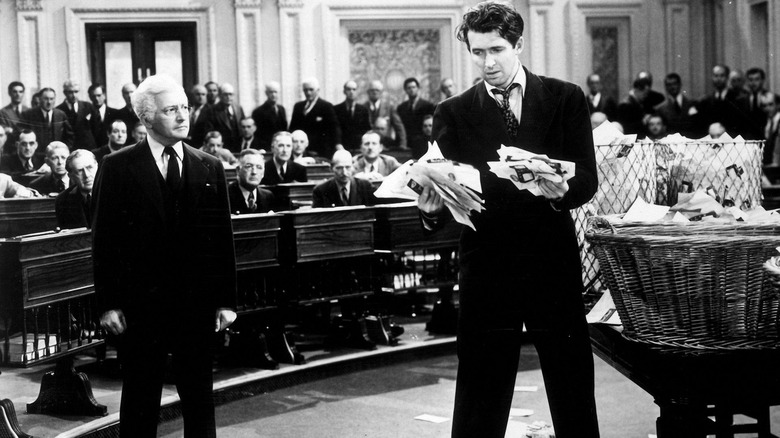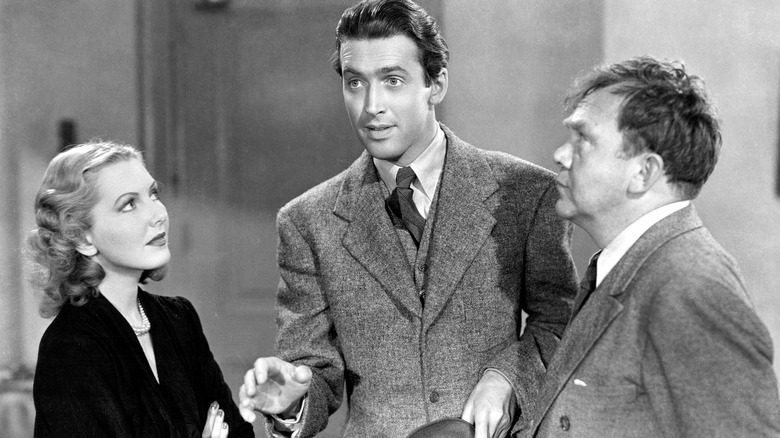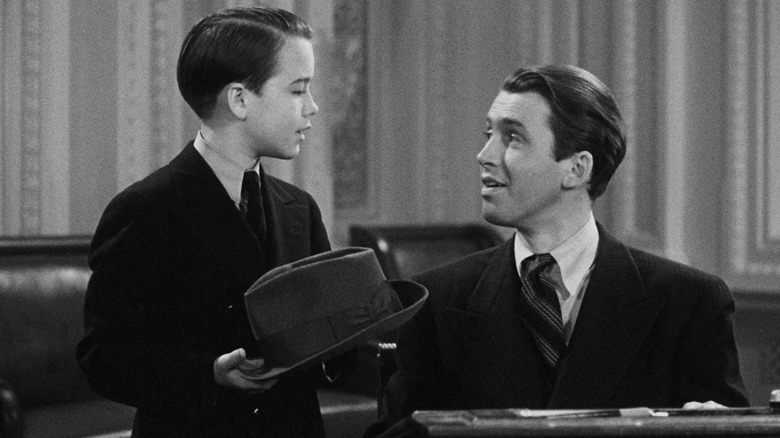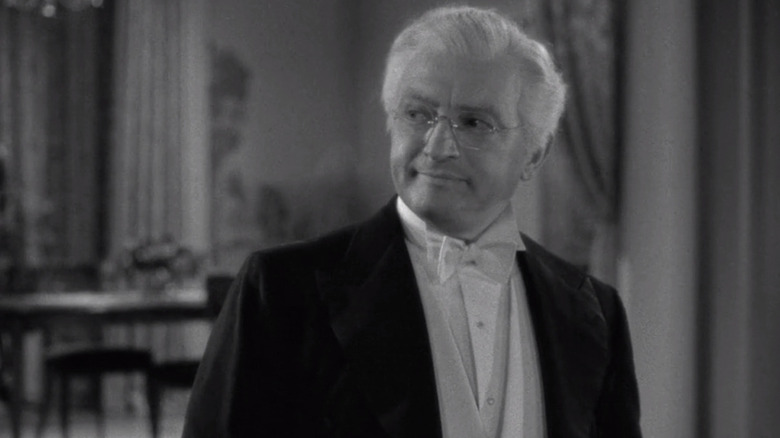Mr. Smith Goes To Washington Ending Explained: I Guess This Is Just Another Lost Cause
It bears repeating that Frank Capra's classic "Mr. Smith Goes to Washington" is a fundamentally important film in the annals of American politics. The 1939 production tells the story of an optimistic Boy Scout leader named Jefferson Smith (James Stewart) who, following the death of a local senator, is recruited to be his replacement. The corrupt DC locals (represented by an excellent Claude Rains) assume that Smith — dazzled by his own natural patriotism and overwhelmed by his new position — will serve as a handy, clueless figurehead while they go about their business of bilking people and passing untoward laws. When Smith proposes a federally sponsored boys camp at a placid creek he knows — Smith was encouraged to pen a bill to keep himself busy, aided by Clarissa Saunders (the incomparable Jean Arthur) — he finds that the land had been unethically earmarked for a dam that was being built for the soul purposes of graft and embezzlement.
Smith loses a piece of his soul when he realizes how much wickedness there is in DC. Additionally, Smith will be transformed into the scapegoat for the graft scheme. Saunders encourages Smith to prove his innocence on the Senate floor by engaging in a filibuster, explaining that he is being set up, that the dam was built for unethical reasons, and that the United States should hold itself to higher standards than what he has witnessed. His filibuster goes on for so long, it inspires protests of support. The little guy fighting against the big guy.
The film ends with Mr. Smith being presented, by Claude Rains, with baskets and baskets of fake letters, asking him to yield the Senate floor. He yells that he is still not licked before passing out. Mr. Smith was defeated. But, in a final twist, the Rains character comes charging back into the Senate , now wracked with guilt, to tell everyone the truth: The letters are fake, and the entire affair was rife with corruption from the start. Perhaps an unrealistic ending, but a satisfying fantasy.
The filibuster
In recent years, there has been a lot of talk about the filibuster in the United States.
Short definition: A filibuster is any means that can prevent the Senate from voting on a particular bill. While the general consensus is that the filibuster was meant to encourage healthy debate between various parties in the Senate, it is more commonly used as a slegdehammer to block bills proposed by the opposition. Indeed, while some Senators may delay a bill indefinitely by talking for as long as they want on the senate floor, as seen in "Mr. Smith Goes to Washington," a simple block is all that is legally required. As such, a minority of Senators have the legislative power to prevent a vote on a bill with majority support. To remind you of your fifth grade civics, a bill requires a 60-vote majority to pass.
In recent years, filibusters have been used to an alarming degree, largely because the Senate has been so evenly split. The filibuster is essentially a gridlock machine. Whenever it is challenged, politicians remind the people that it is meant to serve as the "cooling saucer" for hot debate, referring to an archaic practice wherein a hot drink would be poured into a saucer for cooling prior to consumption (a bizarre image indeed; did the Founding Fathers drink cold coffee from saucers?).
The country's — and even Washington DC's — romantic view of the filibuster comes largely from "Mr. Smith Goes to Washington." The film's final scenes of Stewart, ragged and sweaty and having made himself hoarse, make his constant talking appear like a David of righteousness fighting a Goliath of byzantine bureaucracy. The filibuster is, according to Capra's film, a right for those who might be overlooked to be heard on the senate floor. The romance attached to the filibuster, and the fantasy that it will always be wielded responsibly, has allowed the practice to stay in place long after it has served as any kind of practical tool for healthy debate. The filibuster is not about being heard, nor is it about debate. It's about obstruction.
Hence the many, many calls for reform.
Capra's politics
Frank Capra's personal politics come heavily into play when discussing the meaning of "Mr. Smith Goes to Washington." Capra was born in Sicily in 1987 and emigrated to the United States when he was five. He was a conservative Republican, and he spoke out against Roosevelt's policies during the Great Depression. Capra's films are often about communities coming together to do the right thing in the face of pencil-pushing, regulation-minded governmental agents (this is a big theme in 1938's "You Can't Take it With You" as well as 1946's "It's a Wonderful Life"). This was Capra expressing his dismay with "large government," a longtime rallying cause of the American Right: Let people to their own means, do not regulate them, and they will do the right thing.
Capra had incredible faith in human morality and his characters are an inspiration regardless of one's own political leanings.
But when viewed in a certain light, Capra's views also leaned heavily to the left. He was very civic-minded, and "Mr. Smith Goes to Washington" is about the innocence and purity of engaging the American financial system to fund something as humble as a Boy Scout camp for wayward children. "Mr. Smith" argues that funds would be better allocated for social programs than for large-scale government building projects, a longtime rallying cause for the American Left. Indeed, "It's a Wonderful Life" was once condemned by the FBI for being Un-American, as it expressed Communist views. Mr. Potter was, according to the FBI, seen as an attack on American bankers. It's hardly a Communist pamphlet, as "Life" merely criticizes corruption and greed.
Capra himself would eventually begin leaning more and more Leftward as he aged. Capra made a series of propaganda documentaries during WWII called "Why We Fight," and one can sense the director's ambivalence toward war throughout that series. He ultimately argued that fighting this particular war was necessary, but that war in general was a grand failing of humanity. Later in his life, Capra would speak out against the Vietnam war.
'Maybe there really wasn't an America, it was only Frank Capra'
The idealized version of American as presented in "Mr. Smith Goes to Washington" — a placid world of incorruptible patriots who look out at the United States and see a land of gentility, togetherness, freedom, etc. — is a version of America that Capra seems to have felt we ought to be living in. His films were aspirational, speaking gently and logically against obvious ills like greed, graft, and cynicism. Capra was not a hard-fisted scholar, but a folk philosopher who looked at the evil in the world and argued that we can indeed help one another.
Capra's perfect America was often acknowledged as being a pleasant, simplistic fantasy rather than a practical call to action, however. In the 1997 documentary "Frank Capra's American Dream," John Cassavetes was quoted as saying, "Maybe there really wasn't an America, it was only Frank Capra."
The romantic version of America often found in the mouths of its politicians comes not from actual history or hard-researched numbers, but a fiction as represented in media. White Americana is seen as quaint and simple and pleasant in the paintings of Norman Rockwell. The economic struggles and hard work done by the protagonists in Horatio Alger's novels "Ragged Dick" (1868) and "Struggling Upward" (1890) presented an America wherein anyone who worked hard enough could succeed, and anyone who failed wasn't working hard enough. The image of America presented by these fictions has developed into a hard-minded, irresponsible Libertarian philosophy wherein wealth is proof of hard work and poverty is due entirely to laziness. Systems are not corrupt, but people are, Alger argues.
Adding to the myth is Capra. The halcyon Americana in his films is glorious and optimistic. Capra encourages embracing the needs of one's fellow citizens, and fighting corruption as it is discovered. He also stated, point blank, that the systems will fold in the face of sincerity and honesty. That revealing dishonesty will lead to shame, self-censure, and eventual repair. The ideal of "Mr. Smith Goes to Washington" may not have existed in any sort of realistic or practical sense.
It's a nice fantasy, though.



